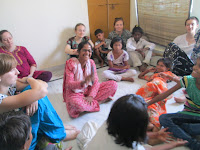"I wasn't sure if abuse was a normal thing that happened with everyone around or just me."
Sambhali Trust, in collaboration with Child Welfare Committee, organised a conference that directly addresses child sexual abuse. This is an incredibly taboo subject in India, and rarely reported for many reasons. Firstly, the victim and their family are highly stigmatised which means there are severe social repercussions of reporting such abuse. Secondly, the lack of education about these matters and the fact that it is never talked about means children do not know that what is happening to them is wrong. Worryingly, among children that are abused, 28% tell a trusted adult and only 3.4% of cases are reported to the police. The combination of these factors means that child sexual abuse in India is a unique and highly sensitive topic. Most importantly, the silence allows the abuse to continue. Which is where this conference comes in.
The Good Touch Bad Touch conference was a radical step not only in educating people (parents and children) but even by discussing the issue and mentioning the word 'sex'. The aim is to make it impossible to for people to remain ignorant, and instead confront this serious subject. The conference discussed the complex social issues that perpetuate the oblivion of Indian citizens to sexual abuse. Sarah, a Sambhali psychology intern from America, talked the audience through how parents should approach children and make them aware of sexual child abuse, showing how simple this conversation can be. This video, from Amir Khan's popular talk show, is highly accessible and shows how such a short and simple conversation with a child can have profound effects.
We had a panel discussion, where questions were put to professionals from different fields - doctors, headteachers, lawyers, psychologists and social workers. People from the audience asked questions related to their personal experiences of sexual abuse, the role of the parents, the role of the state and support available, such as Childline. It was a very animated discussion, and amazing to see so many people spanning across so many fields unite and share a common urge to tackle this taboo. This conference has laid the foundation for child sexual abuse to be considered as paramount in education, law, policing and policy.
We want No - Go - Tell to be made compulsory in schools throughout Rajasthan. We want children to understand that 'bad touches' are unacceptable, that they are innocent victims and that they should tell a trusted adult. We want parents to teach children this. And we want parents to trust their child and act when their child confides in them. We want parents to prioritise their child and report the incident so that no other child can be abused by this criminal. We want society to stigmatise the criminal and support the victim. And we want the law to be practiced, and victims to be punished.


















